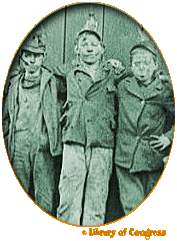



 |
 |
 |
 |

|
|||||

|
b) Yes
Unfortunately, because you had to spend most of your time at work, there was little time for you to receive an education. If you were lucky, you might learn how to read and write your name, but little else. There were fewer opportunities for schooling for young girls than for young boys during this time. In addition, since they were poor and struggling just to survive, most Irish families did not stress the importance of education but instead emphasized the need to work. Still, every year you might experience a very exciting event in your life. What would that be? Chances are that young Irish boys probably attended at least one of the annual celebrations held on March 17 to commemorate St. Patrick’s Day. In cities with large Irish populations such as New York, Boston, and Chicago, residents held large, festive parades, along with speeches, and food, every year to mark the patron saint of Ireland’s special day. Also, in many cities, large numbers of Irish immigrants became policemen and firemen. These groups also sponsored friendly competitions and contests, as well as annual dances such as the “Policemen’s Ball,” and the “Firemen’s Ball,” which you might have attended when you were older. Do you know of special holidays that are celebrated by other ethnic groups in the United States? Make a list. Then go to your local library and find out how these holidays came about. |
||||
| Select another nineteenth-century boy or girl and see how you would survive a day in their life. | |||||

|

|

|

|
||
|
African- American boy
(ca.1865) |
Native American boy
(ca.1855) |
Frontier girl
(ca.1860) |
Upper-class girl
(ca.1875) |
||